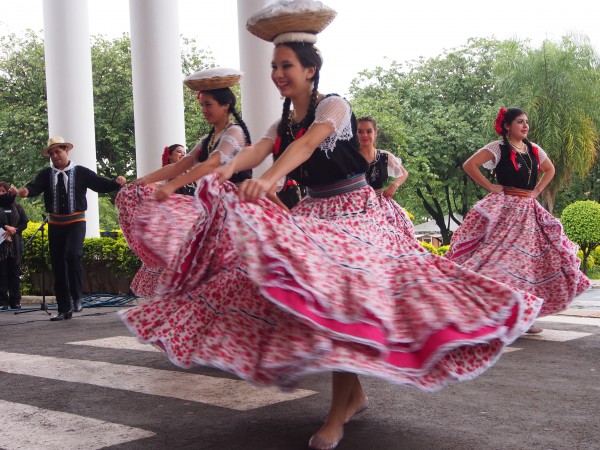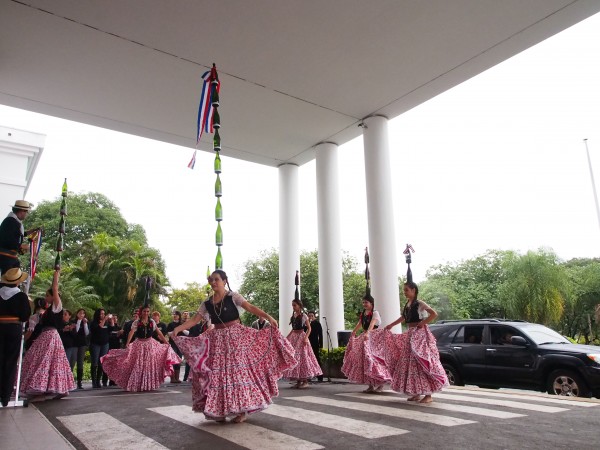Nosotros. You learn it early on in Spanish class, the first person plural, what happens when you add someone to your self. I plus you is we. Right?
Not so fast.
As you may or may not know, I just got back from Paraguay.
So, Paraguay. There are many reasons why Paraguay has been on my list of places to go.
1. It’s not that far
2. I had entered unknowingly semi-illegally once (whoopsie!)
3. It has big rivers
4. Very few people I know have ever been there
5. Paraguay has achieved a level of knowledge of and speaking in Guaraní (an indigenous language group) that far exceeds the actual indigenous population. That is to say, many people who do not define themselves as indigenous speak (a semi-urbanized form of) Guaraní. It is even, I’m told, viewed as “cool” among the politicized youth to speak it. Yay for healthy and growing languages!
6. (related to 5), I wanted to listen to how people mixed the two languages. As a consequence, my notebook is scribbled with pages that say something like G-G-G-G-G-G a lo mejor or G-G-G-G cualquier cosa, etc. where G refers to the person speaking in Guaraní, and the other words are pat phrases in Spanish meaning, respectively “most likely” or “if anything comes up.”
One of the interesting features of Guaraní, in which I can only reliably remember one expression, which is “mishi mi,” which means a little bit, and I only know that because someone told me and then I saw it in a advertisement, is the fact that it has two “we” words.
One of them ore, means us, but not you. We went to Paraguay, meaning (for example), Cari and I went, but you did not. Which is probably the case, see point 4, above.
The other one of them is ñande, which means, “we” including you. So we have never seen a real-live unicorn (in a universe where unicorns exist=0, and please forgive me the logic blabla, I do enjoy throwing it in there).
But as I mentioned, I don’t speak Guaraní. But I do speak Chilean Spanish. So I’m going to tell you a little about the we (and the we- forms), as applied here. The nosotros form of the verb is the one that ends in –amos or –imos. Vamos, means “we go” or “shall we,” and in the past, it is “fuimos” (further proving that the irregular verbs are nearly always the super important ones, than you Stephen Pinker, pop linguistics, and a mind like a steel trap).
So you’d think that when I say, for example, “Fuimos con Cari a Paraguay” (literally, we went with Cari to Paraguay), that there were how many people involved? If you were speaking English, that’d be, at least three. We (which is me and someone else), and then Cari.
But as it happens, in Chilean Spanish, Fuimos con X can easily mean “X and I went,” in which there are only two people involved. (Which is in fact, what happened in this case).
What?
Why?
I think (and this is just a theory) that it’s because in the Chilean culture, it is rude to be autoreferente, which you could mean self-absorbed, but in this case means “to talk about yourself (all the time)”. If you want to say “Cari and I went,” the expression (as you are taught it in high school) could be “Cari y yo fuimos.” But Spanish has a very free word order due to the fact that it is heavily-inflected, meaning all verbs and adjectives are easily connected with their subjects, objects and direct objects through verb endings, gender and number agreement. So in order to emphasize a word, you (generally speaking) bring it to the front of the sentence.
Let’s say it’s the “going” that needs emphasis. No problem. Move the go-verb up to the top of the sentence.
But now I have a problem. I wouldn’t normally say (in Chilean Spanish) “Fui con Cari,” because I’m using the I form at the front in a sentence about two people, which is rude. (fui is the first person singular form, and it would be fine if I were the only person who went, I can easily say, “fui sola.”
So instead, I say, “Fuimos con Cari,” (or fuimos con la Cari, which is a whole nother post).
And of course, by now I have adjusted to this, and so when someone says, “fuimos con” or any other nosotros-formed verb, I withhold my guess about what is going on until later in the conversation, which is probably what Guaraní speakers have to do when they hear nosotros or we or nous or whatever other we-words are, to figure out if they’re included or not included.
We had a great time in Paraguay.
Now you do the math.
Photo 1: a dance performed at the Centro Paraguayo-Japonés for the Fiesta de San Juan. It celebrates the chipa (national bready snack) and the chipera (the woman who sells them). I think every culture should have a dance and song related to their national snack. Anyone working on the completo dance?
Photo 2: a dance involving the balancing of great numbers of bottles atop women’s heads. They are awesome, though I was told that the number of bottles in this picture is not that impressive. However, the roof we were under would not have allowed any more bottles, and also, seriously? I don’t even think I could dance with the chipa basket, let alone even one bottle, to say nothing of all the skirt-twirling.












I really like these language posts; it´s true, we avoid the self reference, for being rude, maybe that´s why we feel some neighbors as swellheads when they talk
Oddly enough….
in chilean spanish if two people are talking about something of mutual relation or property, instead of “our” they will both continue to say “my”.
Two brothers talking to each other will each refer to “mi mama”
I remember the first time i reflected upon this i was startled when my boyfriend walked in the door of the house we shared. He had called me and said “voy a mi casa”… so i naturally assumed that, instead of going to our house which we share, he was going home to his parents house.
I always think of your example as if the other person was in parenthasis. Like, Fuimos (con Juan) al supermercado. 🙂
my sister and I use “your mother” when we are talking about something that has annoyed us. Do you know what “your mother” did? Also, “fuimos con juan” can just mean “juan and I went” which I still think is odd when you first hear it, do you?
Your point about the possessives is interesting! I will make sure to listen for it! My house is my house then, not mi casa es nuestra casa!
yayyyyyy, lo achunté. I always assumed it was to avoid rudeness. And I’m glad you like the language posts. Might not have much of a following on them, but at least I like them! And I’m not ready to talk about Paraguay. I’d like to think about it for a while first.
Thanks for dropping by!
While I’m here, Guarani loan words (there are a few more, can’t remember them now):
Jaguar (to the world)
-guay for place names (eg Paraguay, Uruguay.)
And my personal fave “che”, because Argentines are horrified when they find out “their” word is a loaner….from another country no less!
Chipa seriously seriously rules.
Thanks, Otto! If I never eat another chipa (aside from chipa pirú, which is great), it will be too soon. Stevia is also from Paraguay, as is mate. We have a few expressions in Chilean Spanish regarding Paraguay, one of which has to do with drugs, the other with sex. Expressions having to do with rock and roll are still pending.
Quizás, y sólo quizás, sea una reminiscencia en nuestro hablar del esfuerzo hecho por nuestros ancestros que hablaban en mapudungún, la lengua mapuche, de habituarse a hablar en español.
El mapudungún tiene tres números de pronombres: sigular, DUAL, y plural, por tanto, en vez de ser 6 como en español, son 9…
Cuando especificamos con quien incurrimos en la ación del verbo (“fuimos con Cari”, “fuimos los tres”) es como si inconcientemente le dijésemos al oyente que forma pronominal, y por ende, conjugación verbal, necesitase él para poder expresar el mismo hecho en mapudungún…
Es una explicación que se me ocurrió recién, ahora que pensaba en lo que dijiste… puede que esté completamente equivocado….
Sobre pronombres duales, Wikipedia nos dice esto…
http://es.wikipedia.org/wiki/N%C3%BAmero_dual
Tengo un libro que se llama “Spanish on Four Continents” y habla del “language contact” y como afecta al idioma (en este caso, el castellano). Por ejemplo, el artículo usado para referirse a una persona (del ejemplo, fuimos con LA Cari), dice que algunos casos viene del Quechua. Lo escuché por primera vez en Ecuador.
También me interesa el “language interference” que es lo que ocurre cuando uno usa una forma gramática en el segundo idioma que no existe pero si existe en el primero. De hecho, aprendí de forma pasiva mucho castellano escuchándoles a mis alumnos hispanoparlantes en EEUU, notando los errores mas comunes entre ellos, y siempre venían desde el español (tal como “dream with x” en lugar de “dream about x” cuando es “soñar con” en castellano). o “pregnant of” (en lugar de pregnant with).
En el misterioso caso del nosotros “singular”, he escuchado muchas veces amigas gringas que viven en Chile duplicando el “fuimos con” cuando hay 2 personas en INGLÉS! Que sería 1. language interference y “back formation.” Excelente. Me siento como arqueóloga linguistica, cavando para ver de donde viene nuestro lenguaje perfecto, con todos sus desperfectos.
Gracias por tu aporte, como siempre, César! Me da lata que no tengas un blog, o que no lo dejes enlace a ello!
Yes, I’ve always found this use of “we” in Chilean Spanish to be interesting. In Chinese there are two forms of “we.” 我们 (wǒmen) translates very closely to “we” as we use it in English and 咱们 (zánmen) specifically includes the listener in the action. The first one seemed to be a lot more common.
awesome, thanks for the info. Chinese and Guaraní. Who knew!
Having two forms for “we” would help avoid those dumb jokes when you say “We went to the movies” and the person you are talking to, who didn´t go, says “we did?”
Still mulling the use of nosotros to possibly avoid rude self-referencing
Annje, while we’re working on a solution for that, I would also like a solution for “Can you pass me the salt,” responded to with “I can,” or “Can I ask you a question” with “you just did.”
Mientras leía pensaba “na’ que ver, usamos ‘fui’ todo el rato”, pero con ‘usamos’ me refería a mí misma, así que… touche.
Para colmo, si lo pienso bien, tienes razón. Porque “Fui con x al cerro”, aunque no sea gramaticalmente incorrecto, suena TAN feo… Es como decirle a la otra persona “ella y yo fuimos, PERO SIN TI, LERU LERU” 😛
Bueno, ya sabes Nat, que no me importa tanto tener la razón sino que incentivar a una conversación sobre el uso del lenguaje.
En cuanto a la gramática, está la “prescriptiva” que dice como se supone que uno tiene que hablar/escribir, y en términos prácticas, está la gramática “descriptiva”, que es la que realmente se aplica. He observado lo que menciono en el post, pero si alguien mas vio otra cosa y lo quiere opinar, bienvenida sea!
SIN TI LERU LERU! (and you didn’t, neener neener!) Gracias por ampliar mi conocimiento de maneras de burlarme de/ columpiar a/ agarrar pa’ el leseo a la gente. 🙂
This is the first time I’m leaving a comment though I thoroughly enjoy reading your awesome blog–especially the language posts!
I think I might have something to add to the topic of the “fuimos con X” construction. It is also used in Polish–the exact same thing, and a few German dialects in the East that may have been influenced by Polish or Slavic languages. I don’t see any special relationship between Polish and Chilean Spanish, though. But, who knows. Maybe it’s just one of those things that is bound to happen because it’s just humanly possible–so things just repeat all over.
Also, the article + proper name happens in German, so you have “der Eric” and “die Eileen.” I think it also happens in French, but am not completely sure, as in “La Deneuve”–as in talking about a diva.
All the Best!
Thanks so much for your comment Eric! I’m always very interested in other languages and how they work, so thanks for rounding out my knowledge! The first time I produced the article plus proper name I was living in Cuenca, and my host family was like WHERE did you learn that, only country folk say that. And I was like, uhm, from you? Funny moment.
I’m glad you took the time to drop by Eric. It’s nice to know people like the language geekery! I shall shortly be inspired to produce some more!
Hi! Feel like a should live a comment too as I´m an italian linguist working in Germany and wíth a brief past in Chile. The first and second persons plural can be considered as special from different perspectives, because we and you (plural) can always corrispond to different combiantion (“I+he”, “I+he+she”, “I+many”, “I+ypu” etc). The dual is something that tends to go lost in language variation and might then be counterbalanced by the use of a specifier complement that makes clear who´s taking part in the action.
For what concerns “la Maria” y “el Jorge”, it´s pretty interisting to see how ithe articles´use is becoming more and more frequent in different languages (for example in German and in Italian, just to mention the ones I use on a regular basis).It´s interesting because Generative Grammar considers personal names as something different from all other nominal phrases, while it might not be the case, or it might change due to the increasing frequence of definite articles.
Hi Irene,
Thanks so much for your comment! I can’t even imagine how you came across my blog, and this particular topic! I studied theoretical linguistics at the undergraduate level, and again a bit in grad school, but do not really consider myself a linguist. That said, the pragmatic and idiomatic use of the language I hear on a daily basis, Chilean Spanish keeps me on my toes. The way it conforms or does not conform to my expectations is a source of endless fascination for me.
That said, I am also fairly obsessed with the use of the simple past vs. past perfect in the various countries in Latin America. In Peru, I felt like there was an “overuse” (in comparison again, with my own expectations) using “hemos ido” when I’d have said fui, and in Paraguay, the opposite, where someone I was speaking to was telling me about the various hills in Asunción, and to note that she’d never been to one of them, she said, “yo no fui” where I definitely would have said, “no he ido,” to signify that while I had not yet gone, the possibility that I might (because the hill still exists) persists. This is particularly interesting to me, because my mother, whose first language is English, but is affected (as are most Jewish New Yorker’s of her age as far as I can tell) by having grown up in partially Yiddish-speaking homes. She often says, “I never ate X” instead of “I have never eaten X.”
I would love to know what you’re working on, how you ended up on my blog, and what you were doing in Chile! I’m going to cc this comment to your email, and just hope you don’t mind. My interest is piqued!
Hi Eileen,
I´m currently taking a PhD programm at the Goethe Frankfurt University and my research interests are within applied linguistics; I´m mainly into the linguistic deficit in neurodegenerative diseases and into second language acquisition. Beside that, I´m a teacher of Italian as a second language . In 2010 I spent some months in Santiago teaching Italian at the Cultural Office of the Italian Embassy. I came across your blog while looking for information and blogs related to Chile as it´s awful how much I miss the country.
I cannot give a clear explanation for the alternation of the different past tenses within the Hispanic countries; what I know is that American Spanish is supposed to be closely bound to Andalucian Spanish, as most colonists arrived from south Spain, and in that area the use of the indefinido seems to preveal on the perfecto. If you are interested in the topic you might like to have a look at “Latin American Spanish (1994) by John Lipski. The book includes some interesting theories on how Spanish spread in America and how language variation took place.
Another thing I´m really interested in is how the all verbal/pronominal system in undergoing major changes in Chilean Spanish. Just think of how “vosotros” was completely reduced and overtaken by “ustedes”. I also suspect there might be some more changes going on with the second person singular. If you don´t mind I´d like to ask you some questions one of this days
Dale, Irene. The vos (or voh) as we use it in Chile is fascinating (did you know it has a subjunctive?). I’d love to talk more! I sent you an email to the one you listed here, or email me at blogname at hotmail.com. It was basically a repeat of the comment listed below.
I have Spanish on Four continents and another one called The romance languages, but I haven’t seen that one, might be interesting. I dedicate my life to something totally different now (as you might have noticed), but the issue of applied linguistics always intrigues me. My background was theoretical, which was a good start, but my love was always the applied. I was pressured into theoretical by researchers who wanted more minions (my opinion, though it was a good experience, regardless).
How interesting what you’re studying, and as for missing Chile, I can totally understand. There’s something special, gets under your skin about the place. At least it has for me!
Looking forward to continuing the conversation!
Eileen